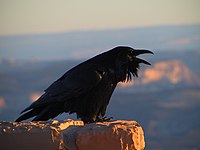Corvid College
Corvid College was co-founded in Boston in October 2009 by Eric Buck, Christian Greer, and Pasqualino Colombaro as an anarchic experiment in education. It has since established a second branch in San Francisco. It is non-hierarchically organized and decentralized as there are no offices, administrators, or preset course meeting spaces, and does not confer official credentials to its students.[1] Teachers and students at Corvid are joined in voluntary association to explore and share in nontraditional ways of learning and subject material.[2]
Name[edit]

The word corvid is a name applied to the Corvidae, the family of birds that includes crows, ravens, jays, magpies and jackdaws. The name symbolizes the non-hierarchical and diversely social nature of Corvid College.[3]
History[edit]
Corvid College was founded in Boston in the fall of 2009. A new branch sprouted in San Francisco in the winter of 2011. In 2013, Corvid College in Boston became "Greater Boston Free School".[4] Eric Buck became the contact for "Logos Tao Deus".[5]
Philosophy[edit]
Corvid is a 'self-managed in spirit, horizontal in structure,'[6] ongoing experiment in educational pedagogy, content, and structure.[7] Corvid uses the college model as well as monetary exchange (as opposed to other educational processes like the freeskool or the skillshare group) to encourage sustained student commitment in a model of education as self-cultivation.[7]
Economic distinctives[edit]
Unlike free schools, Corvid courses are not usually offered gratis. Prices are determined by the instructors and students on a flexible, sliding scale with the possibility for barters instead of money exchange and no potential student is turned away from participating in a course for lack of funds. One instructor has utilized a "reverse bribery" system in which "he charges $200 up front and refunds $20 every time a student attends class" as an attendance incentive. "If a student doesn’t attend, he spends the $20 on wine and snacks for the rest."[2]
Course offerings[edit]
What is taught, how, and where is determined by teacher expertise and student demand. In theory, any topic may be taught for any price so long as a teacher and their students agree to it. "Hoedowns" in which students and teachers congregate, socialize, and discuss potential course offerings inaugurate each upcoming term.[7] Previous course offerings have included: Street Art, Philosophy as a Way of Life, Magic: the Gathering, Cover Fire: A Survey of Blackouts, The Wild Within Us, and Unexpected Flesh: Experimenting with Strange Embodiment in Life, Art, and Speculative Fiction, amongst others.[8]
External links[edit]
References[edit]
- ↑ Faraone, Chris (August 1, 2011). "A study in anarchy". Boston Phoenix. Archived from the original on March 31, 2020.
- ↑ 2.0 2.1 Wright, Andy. "Meet Corvid College, a Radical Experiment in Debt-Free Education". Archived from the original on 2012-02-20. Retrieved 2012-02-18. Unknown parameter
|url-status=ignored (help) - ↑ On the structure and dynamics of Corvid societies, see Bernd Heinrich's Mind of the Raven (New York: Harper Collins, 1999) and Marzluff and Angell's In the Company of Crows and Ravens (New Haven, CT: Yale University Press, 2005)
- ↑ "Corvid College Boston is now the Greater Boston Free School". boston.indymedia.org. Retrieved 2020-04-01. Unknown parameter
|url-status=ignored (help) - ↑ "Forget Higher Education ... - Logos Tao Deus". corvidcollege.wikidot.com. Retrieved 2020-04-01.
- ↑ Carman, Jake (March 2, 2010). "Welcome to Infoshop News : The "Free" School and Boston's Corvid College". Archived from the original on 2013-04-15. Retrieved 2012-02-18. Unknown parameter
|url-status=ignored (help) - ↑ 7.0 7.1 7.2 What's Left. MIT Campus Radio. WMBR 88.1FM, Boston, Massachusetts, 30 Dec. 2011. WMBR 88.1FM / MIT Campus Radio. Massachusetts Institute of Technology, 30 Dec. 2011. Web. 3 Mar. 2012.
- ↑ "CORVID COLLEGE SF : Courses". Archived from the original on 2012-01-17. Retrieved 2012-02-18. Unknown parameter
|url-status=ignored (help)
This article "Corvid College" is from Wikipedia. The list of its authors can be seen in its historical and/or the page Edithistory:Corvid College. Articles copied from Draft Namespace on Wikipedia could be seen on the Draft Namespace of Wikipedia and not main one.
